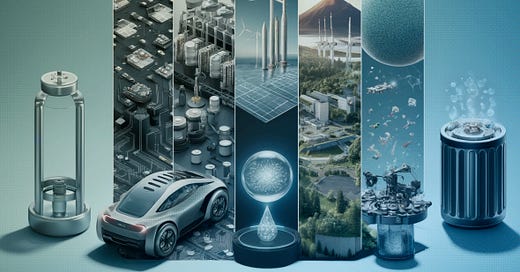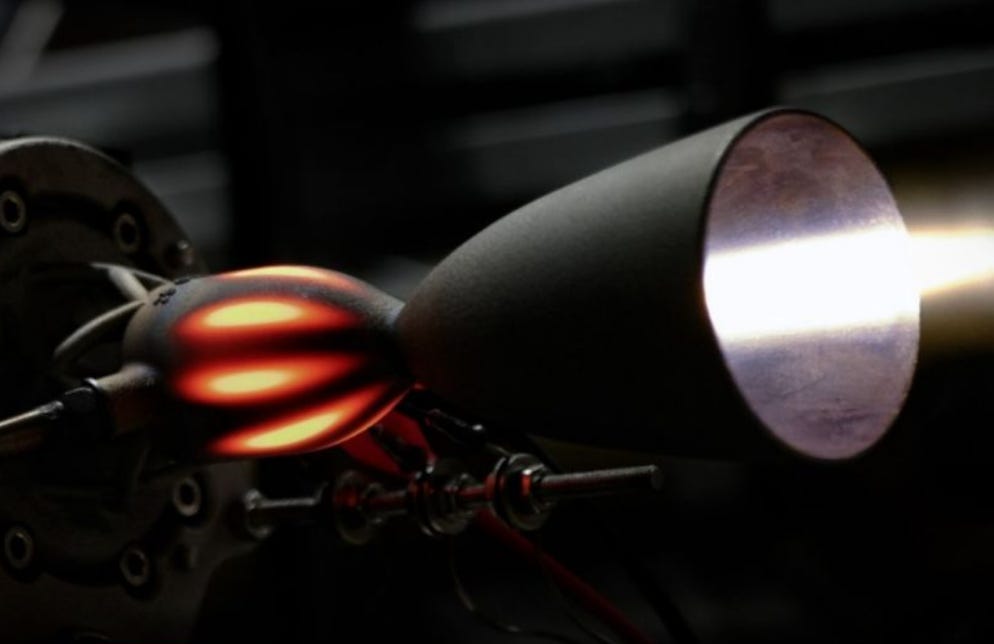Deep Tech Briefing #19: ⚡Silicon Anodes Boost EV Performance; 🌋 Geothermal Power Milestones; 🎬 AI Enhances Movie Production; 🚀 Green Propulsion Systems for Space; 🌊 AI Tackles Water Microplastics
An insider’s update on Deep Tech Economy: Your dose of tech innovations, startups, exponential industries, policies, and market moves to stay ahead and capitalize on it.
Hey there! Welcome to this edition of Deep Tech Briefing, our Sunday column where we break down the week’s top developments in Deep Tech Startups and Venture Capital.
Subscribe for free to get it straight to your inbox every Sunday, and read it whenever you like!
In today’s edition
Silicon Anodes Promise Major Advancements in EV Battery Performance
AI Developments Aim to Revolutionize the Film Industry
Geothermal Energy Makes a Significant Leap with New Agreements
Green Propulsion Technologies for the Future of Space Travel
AI-Driven Solution Improves Detection of Water Microplastics
✨ For more, see Membership | Partnership | Deep Tech Catalyst
🔸Green SpaceTech Propulsion Systems: A Game Changer for the Space Economy?
The space industry, projected to grow at a rate of 7% annually, is seeing an escalating demand for affordable and reliable propulsion solutions. Traditional in-space propulsion systems, primarily based on hydrazine and other hazardous chemicals, pose significant challenges, including high handling costs, extensive safety protocols, and complex operational requirements. These factors contribute to increased overall costs and slower development timelines .
ISPTech, a German Aerospace Center spin-off, is addressing these issues with its groundbreaking propulsion technologies. Recently securing €2M in pre-seed funding, ISPTech is poised to revolutionize space propulsion with two innovative systems: HyNOx and HIP_11.
HyNOx utilizes a combination of Ethane and Nitrous Oxide, offering continuous high-performance operation without the overheating issues that plague conventional systems. This technology is particularly suited for small spacecraft, such as CubeSats, providing a versatile and efficient propulsion solution. Unlike traditional systems, HyNOx's self-pressurizing nature eliminates the need for additional pressurant gases, reducing system complexity and costs .
HIP_11, designed for larger spacecraft like landers, capsules, and satellites, combines the advantages of chemical and electric propulsion. This hybrid approach not only reduces operational complexity but also allows for refueling, extending mission durations and enhancing overall flexibility. The system's non-toxic propellant further reduces handling risks and associated costs .
The funding round, led by HTGF, First Momentum Ventures, and Possible Ventures, underscores the confidence in the field.
"The satellite market growth in the next decade and the increasing need for space debris avoidance maneuvers will see a huge demand for chemical propulsion systems, especially non-toxic solutions," notes Dr. Koen Geurts of HTGF.
ISPTech's solutions are well-positioned to meet this demand, offering high-performance, cost-effective alternatives to existing technologies. However, while ISPTech's advancements are promising, the journey ahead includes significant challenges. Regulatory approvals, space qualification processes, and the competitive landscape will all play crucial roles in determining the company's success. However, with the space propulsion market expected to reach $44 billion by 2030, the opportunities for innovative and efficient solutions are immense.
To illustrate the practical application of ISPTech's technology, consider a scenario where a satellite equipped with the HyNOx system performs orbital adjustments. The continuous high-performance operation ensures precise maneuvers without overheating, while the non-toxic propellants simplify ground handling and reduce costs. This capability not only enhances the satellite's operational efficiency but also extends its lifespan, providing significant value to satellite operators and reducing long-term mission costs.
As the space industry evolves, there is a growing demand for advanced and eco-friendly propulsion technologies. Various companies are now focusing on innovative solutions that balance performance with ecological sustainability. Notably, significant investments are being made to develop hydrazine-replacement technologies that address regulatory and supply chain concerns, while others are pioneering green propellants based on hydrogen peroxide for diverse mission profiles.
With the market expanding and potential regulatory tightening on space debris and environmental impacts, these innovations are set to play a pivotal role in shaping the future of the space economy.
🔸 Big Round to Advancing EV Technology: The Promise of Silicon Anodes
The electric vehicle (EV) industry is experiencing rapid growth and transformation. In 2023, global sales of electric cars reached nearly 14 million, representing






